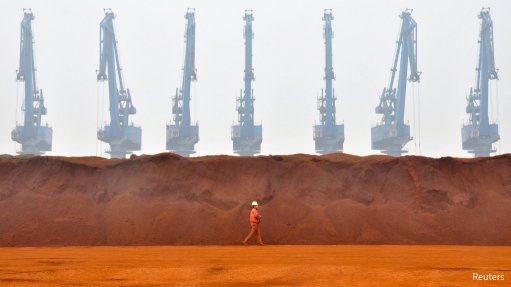New waste management system has multiple environmental benefits


BREAKING IT DOWN The Asher uses lower operating temperatures to reduce waste to an ash more efficiently
Sustainable waste management solutions provider Asher Africa’s latest waste management system effectively decreases a client’s waste output and offers an “almost emissions-free process”, contributing to a client’s decarbonisation efforts.
The Asher, introduced to the South African market in September 2022, is designed and manufactured by waste solution developer Pamarai, in Malaysia, but distributed locally by Asher Africa, based in Umhlanga, KwaZulu-Natal.
“Compared with traditional waste management methods like incineration and autoclaves, the Asher releases significantly fewer emissions,” explains Asher Africa director Krishnan Nair.
It achieves this through lower operating temperatures, which reduces the production of carbon dioxide and other greenhouse gases.
“While exact figures may vary based on the specific waste composition and volumes, the Asher’s environmental footprint is generally substantially lower, compared with that of incineration,” Nair adds.
The Asher significantly contributes to decarbonisation targets by making use of low-temperature thermal degradation.
It also minimises methane emissions from organic waste decomposition, thereby promoting circular economy principles, which reduce the need for energy-intensive manufacturing processes.
Further benefits include lower carbon emissions in terms of waste transportation, owing to its treatment-at-source capability, and overall lower volume of waste being transported.
The Asher can convert 1 t of waste into about 40 kg of ash, reducing the amount of waste and disposal costs.
The system operates with an energy consumption of between 3.5 kWh and 4.3 kWh, which is similar to a 1.5 hp or 2 hp air conditioner and requires no accelerants or the presorting of waste.
It is versatile and adaptable, making it suitable for various sectors and purposes, including healthcare facilities for medical waste management, which reduces the risk of cross-contamination and allows for safe disposal.
Nair adds that municipalities can use the Asher to decrease landfill waste, lower operational costs and improve environmental sustainability.
He suggests that a municipal recycling centre can use the system to handle difficult-to-recycle waste items, such as contaminated plastics, which often end up in landfills anyway.
“Food processing companies and restaurants can also manage food waste using the Asher, thereby supporting responsible disposal,” he says.
By-Product Benefits
The Asher generates ‘nonharmful ash’, which can be repurposed for various applications, such as a filler material in cement or concrete mixing in the construction industry, reducing the need for virgin resources and, consequently, promoting a circular economy.
Additionally, the ash can be used as a nutrient rich soil conditioner to enhance soil quality for agriculture and landscaping.
“Repurposing the ash requires only straightforward logistics and the necessary quality controls to ensure it meets the regulatory standards for its intended applications,” says Nair.
Reluctant to Change
Getting local authorities to invest in new technologies has been the most pressing challenge.
“It comes down to education,” adds Nair, who notes that Asher Africa mitigates these challenges by collaborating with local authorities, providing educational resources for potential clients and adapting the technology to suit local waste compositions and treatment requirements.
The return on investment against the cost of the unit can be realised in as little as three years, he says.
“By adopting the Asher, municipalities, companies and communities can make a positive impact on the environment while substantially enhancing resource efficiency.”
The company continues to actively expand its footprint in South Africa and Africa by establishing partnerships with key stakeholders and promoting the adoption of the Asher across various sectors.
“The aim is to make this innovative technology accessible to a wider range of industries and regions, contributing to sustainable waste management practices while subscribing to the green economy,” Nair concludes.
Article Enquiry
Email Article
Save Article
Feedback
To advertise email advertising@creamermedia.co.za or click here
Press Office
Announcements
What's On
Subscribe to improve your user experience...
Option 1 (equivalent of R125 a month):
Receive a weekly copy of Creamer Media's Engineering News & Mining Weekly magazine
(print copy for those in South Africa and e-magazine for those outside of South Africa)
Receive daily email newsletters
Access to full search results
Access archive of magazine back copies
Access to Projects in Progress
Access to ONE Research Report of your choice in PDF format
Option 2 (equivalent of R375 a month):
All benefits from Option 1
PLUS
Access to Creamer Media's Research Channel Africa for ALL Research Reports, in PDF format, on various industrial and mining sectors
including Electricity; Water; Energy Transition; Hydrogen; Roads, Rail and Ports; Coal; Gold; Platinum; Battery Metals; etc.
Already a subscriber?
Forgotten your password?
Receive weekly copy of Creamer Media's Engineering News & Mining Weekly magazine (print copy for those in South Africa and e-magazine for those outside of South Africa)
➕
Recieve daily email newsletters
➕
Access to full search results
➕
Access archive of magazine back copies
➕
Access to Projects in Progress
➕
Access to ONE Research Report of your choice in PDF format
RESEARCH CHANNEL AFRICA
R4500 (equivalent of R375 a month)
SUBSCRIBEAll benefits from Option 1
➕
Access to Creamer Media's Research Channel Africa for ALL Research Reports on various industrial and mining sectors, in PDF format, including on:
Electricity
➕
Water
➕
Energy Transition
➕
Hydrogen
➕
Roads, Rail and Ports
➕
Coal
➕
Gold
➕
Platinum
➕
Battery Metals
➕
etc.
Receive all benefits from Option 1 or Option 2 delivered to numerous people at your company
➕
Multiple User names and Passwords for simultaneous log-ins
➕
Intranet integration access to all in your organisation


















